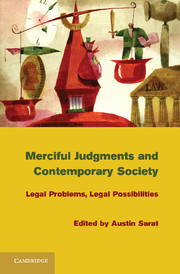Book contents
- Frontmatter
- Contents
- Acknowledgments
- Contributors
- When Can or Should Legal Judgment Be Merciful? An Introduction
- 1 The Place of Mercy in Legal Discourse
- Commentary on Chapter 1
- 2 Mercy, Crime Control, and Moral Credibility
- Commentary on Chapter 2
- 3 Defending a Role for Mercy in a Criminal Justice System
- Commentary on Chapter 3
- 4 Actions of Mercy
- Commentary on Chapter 4
- 5 A Feminist View of Mercy, Judgment, and the “Exception” in the Context of Transitional Justice
- Commentary on Chapter 5
- Index
- References
1 - The Place of Mercy in Legal Discourse
Published online by Cambridge University Press: 05 December 2011
- Frontmatter
- Contents
- Acknowledgments
- Contributors
- When Can or Should Legal Judgment Be Merciful? An Introduction
- 1 The Place of Mercy in Legal Discourse
- Commentary on Chapter 1
- 2 Mercy, Crime Control, and Moral Credibility
- Commentary on Chapter 2
- 3 Defending a Role for Mercy in a Criminal Justice System
- Commentary on Chapter 3
- 4 Actions of Mercy
- Commentary on Chapter 4
- 5 A Feminist View of Mercy, Judgment, and the “Exception” in the Context of Transitional Justice
- Commentary on Chapter 5
- Index
- References
Summary
Introduction
Legal discussions of mercy tend to be messy even though everyone engaged in them accepts the same basic definition of the concept. Mercy is the suspension or reduction of a punishment that is deserved. Writers from every age attach elaborations of their own to test or confirm a specific theory, but the basic definition holds, and it is simple enough. Nothing, however, is simple or even direct the moment the concept is brought into a legal frame of reference.
To deserve a degree of punishment in law has two prongs: the legal stipulation of redress and the moral code in support of it. When stipulation and code cohere, the law proceeds with certainty. When stipulation and code diverge over the endless particularity in deviance, then uncertainty, debate, acrimony, and controversy enter the legal process and create a zone where thoughts of mercy become more prevalent.
- Type
- Chapter
- Information
- Merciful Judgments and Contemporary SocietyLegal Problems, Legal Possibilities, pp. 19 - 82Publisher: Cambridge University PressPrint publication year: 2011



